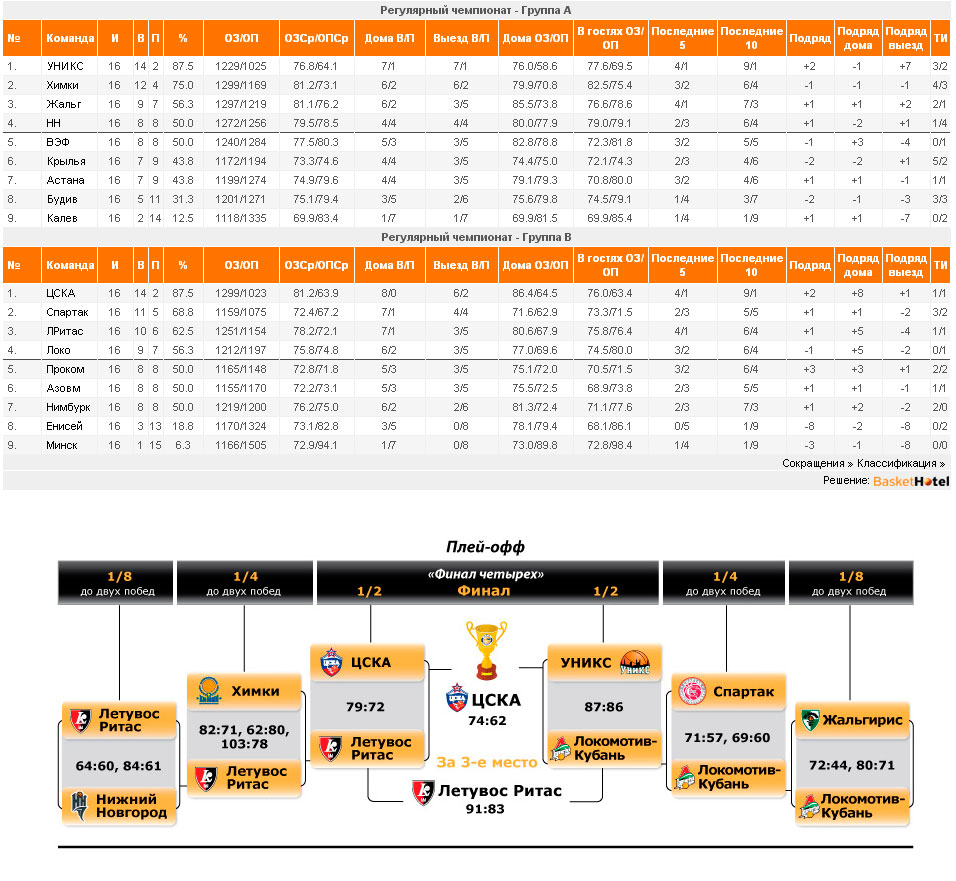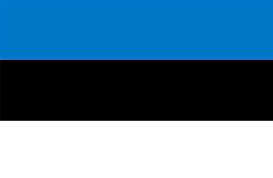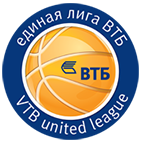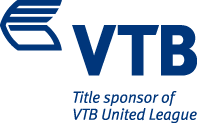History of the League
The league expanded to 18 clubs and 9 countries in 2011 and added a preseason qualifying tournament. Several rookie clubs took the league by storm and the battle for the final playoff spots was vicious. The season concluded with the league’s first playoff bracket and a thrilling Final Four in Vilnius. Andrei Kirilenko made a triumphant return to Russia, Jonas Valanciunas, Patrick Beverley and Timofey Mozgov drew the attention of NBA scouts, and CSKA captured another title in the VTB United League’s third season.
Everything was bigger in 2011 as the VTB United League made the anticipated jump from 12 to 18 clubs. As shared by president Sergey Ivanov at the end of the 2010-11 season, in addition to increased interest from clubs in Eastern Europe and Kazakhstan, the league was also in talks to combine with the Professional Basketball League the following season:
“PBL clubs unanimously voted to begin working on uniting with the VTB United League in 2012 at the end of the season. I’ve taken that request into consideration. We’ll look at how realistic it is. We are looking at expanding the league to 18 teams. Two groups of 9 teams, a round-robin schedule, playoffs and Final Four.”
These plans to massively expand the league became reality. In comparison to the second season, the league’s territory had expanded as well as the number of participants. There were even more clubs than the schedule could accommodate, prompting the organization of a qualifying tournament, which was held from September 27 to October 1 in Siauliai, Lithuania. Six contenders from five countries (Enisey, Russia; Krasnye Krylia, Russia; Dnepr, Ukraine; Anvil, Poland; Siauliai, Lithuania; Torpan Poyat, Finland) battled for two regular season berths. In the end, both Russian clubs came out on top: Krasnye Krylia Samara and Enisey Krasnoyarsk.
The following six clubs also joined the league in 2011: Lokomotiv-Kuban (Russia), Nizhny Novgorod (Russia), Spartak (Russia), Nymburk (Czech Republic), Astana (Kazakhstan) and Budivelnik (Ukraine). The decision to include these clubs and change the competition format (the Final Four was now preceded by two playoff rounds) was made at the league board meeting in Riga. The gathering also featured the regular season draw, which divided the clubs into two groups.
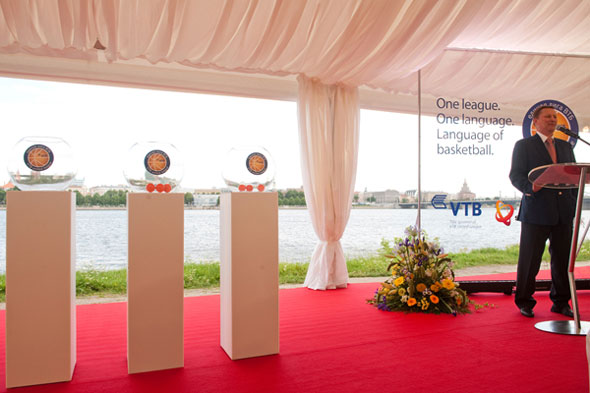
Thus, 18 clubs from 9 countries opened the VTB United League’s third season. Russia had the biggest contingent (Khimki, UNICS, Nizhny Novgorod, CSKA, Spartak, Lokomotiv-Kuban, Krasnye Krylia and Enisey), followed by Ukraine (Azovmash, Budivelnik) and Lithuania (Zalgiris, Lietuvos Rytas). Latvia (VEF), Estonia (Kalev), Belarus (Minsk-2006), Poland (Asseco Prokom), Kazakhstan (Astana) and Czech Republic (Nymburk) each had one club.
The teams were divided into Group A (UNICS, Khimki, Zalgiris, Nizhny Novgorod, VEF, Krasnye Krylia, Astana, Budivelnik, Kalev) and Group B (CSKA, Spartak, Lietuvos Rytas, Lokomotiv-Kuban, Prokom, Azovmash, Nymburk, Enisey, Minsk-2006) during the regular season. The top four teams from both groups advanced to the postseason. The first-place team in each group advanced directly to the Final Four, while the two remaining berths were decided by the league’s first ever playoff bracket. Teams in third and fourth place met in the round of 16, with the winners advancing to play the second-place teams in the quarterfinals. Each series was best-of-three.
Regular Season
The season’s official opening game was held in Krasnodar, featuring Lokomotiv-Kuban and Lietuvos Rytas. The game was also the first to be played at Lokomotiv’s brand-new Basket Hall, though it ended in disappointing fashion for the hosts, who dropped a 78-71 decision. Andrei Kirilenko’s return to CSKA also made headlines. After 10 years in America, the Russian legend decided to return home due to the prolonged NBA lockout. AK-47 made his debut against Spartak St. Petersburg, where he had begun his professional career. The game stirred up enormous interest and ended with a sensational loss for Kirilenko and Co. (83-81 in favor of Spartak, led by American point guard Patrick Beverley).
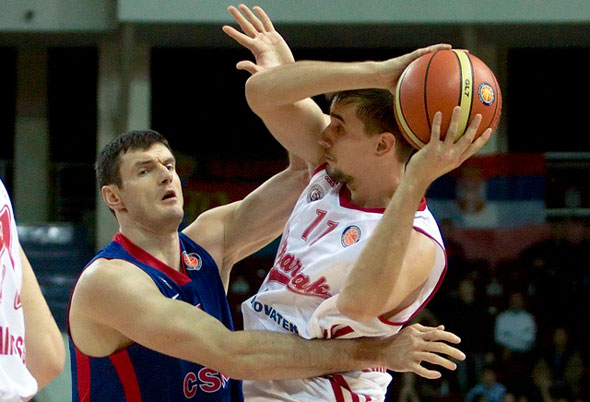
The decision to expand the league proved an excellent one. The fans enjoyed an excellent regular season with lots of interesting games and heated competition. The league’s rookie clubs especially impressed. Nizhny Novgorod finished fourth in Group A, while both Lokomotiv-Kuban (4th) and Spartak (2nd) reached the postseason in Group B.
There were familiar faces at the top. CSKA and UNICS continued to dominate. The two clubs had finished with identical records in the two prior seasons (5-1 and 9-1), before recording 14-2 marks in the league’s third season to advance directly to the Final Four. Reigning champs Khimki took second place in Group A, followed by Zalgiris. A December game between the two clubs in Khimki was Timofey Mozgov’s last in the Yellow-Blue, with the Russian center moving on to the NBA. He left on a winning note, leading Khimki to an 83-72 victory. The second game between these two clubs was another highlight of the regular season. After 40 thrilling minutes of regulation, Sonny Weems gave the Lithuanian champs a heart-stopping 95-94 victory with a dunk at the buzzer.
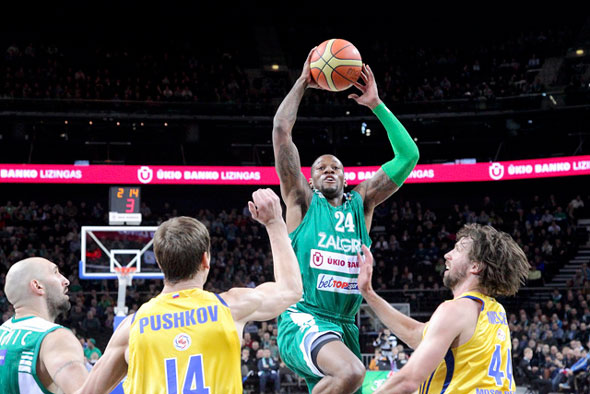
Lithuania’s Lietuvos Rytas joined three Russian clubs—CSKA, Spartak and Loko—in the top four in Group B. The battle for the playoffs was heated as Prokom, Azovmash and Nymburk finished with 8-8 records, one game behind Lokomotiv.
Surprise
Nymburk. The Czech newcomers opened the season with five losses, but refused to throw in the towel. The Lions responded with a six-game winning streak and were in contention for a postseason berth until the final week of the season. Most impressively, Nymburk was one of only two teams to defeat CSKA during the regular season.
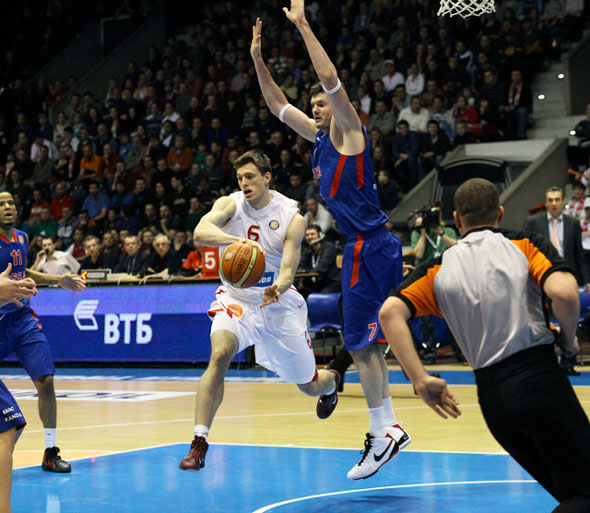
Undefeated since the season-opening loss in St. Petersburg, the Army powerhouse got rocked in Padrubice by Ronen Ginzburg’s Cinderella squad. Nymburk cruised to a 19-point victory, a shocking defeat for CSKA, even if they were missing several team leaders.
Headline
Andrei Kirilenko’s return. After 10 years in the NBA, Kirilenko put on a CSKA jersey and played a full season in Russia (choosing not to leave in December following the end of the lockout). The King returned to his homeland to win a championship and reward his loyal fans.
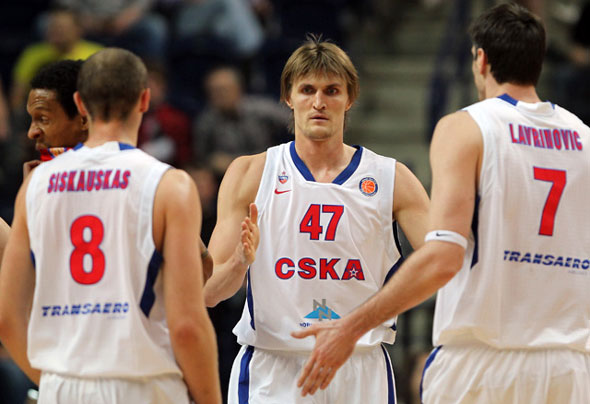
AK-47 fit in quickly at CSKA, establishing himself as a team leader. In addition to donating his entire salary to charity, the Russian national team star won numerous awards at the end of the season (including top European player per FIBA-Europe and Italy’s La Gazzetta dello Sport). He did more than just win games and trophies, however, also drawing fans and increased attention to the VTB United League thanks to his immense popularity.
Playoffs
The last two participants in the Final Four were decided by a two-staged playoff. Lietuvos Rytas and Lokomotiv-Kuban came out on top, after finishing third and fourth, respectively, during the regular season. Lokomotiv-Kuban didn’t lose a single game, sweeping Zalgiris and Spartak. Lietuvos Rytas had a more difficult path. While Vilnius eliminated Nizhny Novgorod in the first round, 2-0, the Lithuanians were then matched up against reigning league and Eurocup champs Khimki. Nonetheless, Rytas overcame Moscow Region and former head coach Rimas Kurtinaitis in three games, ensuring that there would not be an all-Russian Final Four.
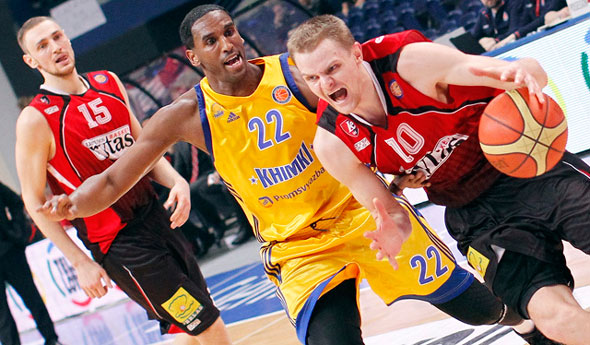
The Final Four was held in Vilnius at the Siemens Arena. Game 1 was an instant classic as UNICS and Lokomotiv-Kuban needed all 40 minutes to decide who would advance to the championship game. Loko’s 3-point shooting led by Roderick Blackney (5-5 in the first three quarters) allowed Krasnodar to take a four-point lead with 10 minutes to go.
But Henry Domercant would not be stopped in the 4th quarter, scoring 17 of Rytas’s 25 points. Krasnodar led by one, 86-85, after knocking down a ‘3’ with 6.8 seconds on the clock, before Domercant shook off Sergey Bykov at the other end and drained a mid-range jumper with two seconds to play! K.C. Rivers missed a desperation heave at the buzzer, giving UNICS an 87-86 victory and berth in the final.
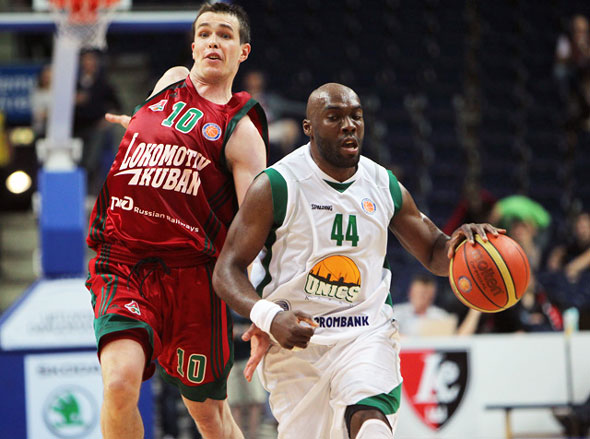
The second semifinal was preceded by the opening ceremony, which gave Lietuvos Rytas an extra boost of energy. The home team battled valiantly against CSKA and very nearly secured the upset, but Kirilenko would not be denied. The Russian forward drilled a ‘3’, knocked down two free throws, completed an ‘and-1’ and secured a key steal in the final seconds to help CSKA emerge with a 79-72 victory.
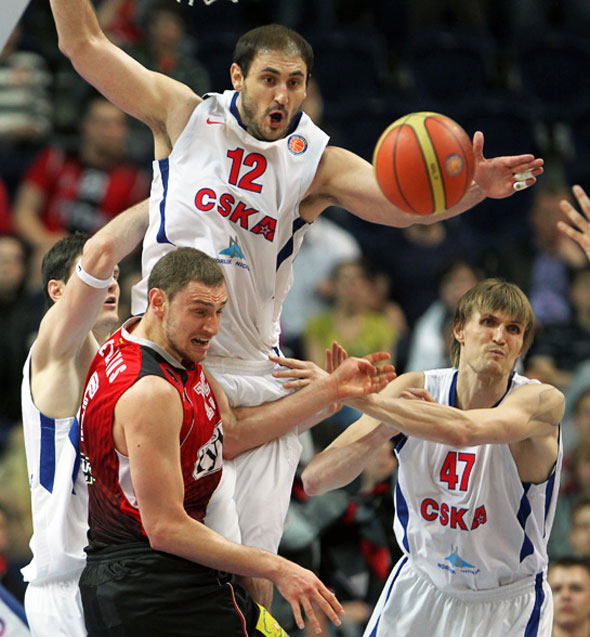
The Final Four also featured the league’s second Friends of Basketball exhibition. This time around, a team of Russian sports journalists faced off against their Lithuanian colleagues. Russia’s Sergei Elevich coached his countrymen, while Lithuania’s Tomas Pacesas paced the sideline for the home team. The more seasoned Lithuanians won in convincing fashion, securing a 22-10 victory.

A pattern had emerged in the first two Final Fours. Both times, the home team had been eliminated in the semifinals, before bouncing back to win the 3rd-place game the following day. Zalgiris did it in 2010 and UNICS followed suit in 2011. 2012 would prove no different as Lietuvos Rytas took the bronze with a 91-83 victory over the rookie club from Krasnodar.
That set the stage for the championship. CSKA had five Lithuanians on its roster and staff: head coach Jonas Kazlauskas, players Ramunas Siskauskas and Darjus Lavrinovic, conditioning coach Evaldas Kandratavicius and scout Benas Matkiavicius. The Army Men felt very comfortable in the Lithuanian capital as a result and opened the game on an 11-1 run. But UNICS coach Evgeny Pashutin had won the championship with CSKA in Kaunas two years before and knew the Army Men too well to let his team give up without a fight. Kazan bounced back, keeping CSKA within striking distance in the 2nd and 3rd quarters, though it would fail to make it exciting in the final minutes.
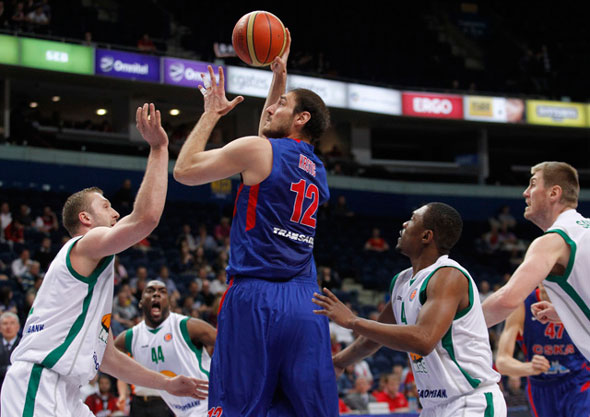
The Army Men opened the 4th quarter on a 9-1 run, erasing any remaining doubt as to the outcome. As the bench players started trying on the championship hats, CSKA secured a 74-62 win and regained the VTB United League crown.
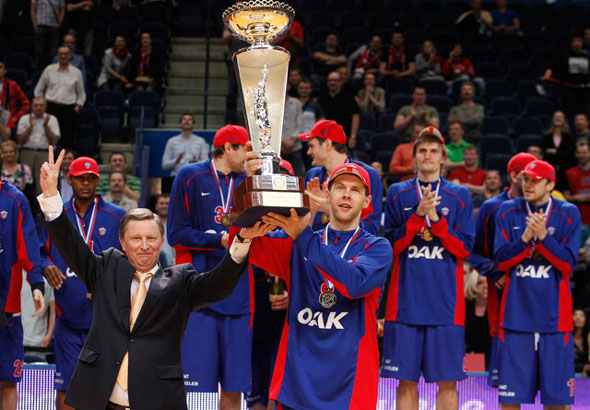
Khimki did not defend its title, but impressed with an eight-game winning streak and the spectacular play of Kresimir Loncar. Despite averaging just 23 minutes per game, the Croat finished 2nd in efficiency rating and was a serious contender for MVP.
23-year-old Lietuvos Rytas center Jonas Valanciunas, selected 5th in the 2011 NBA Draft, proved one of the league’s most reliable, consistent performers and helped his club finish in 3rd place.
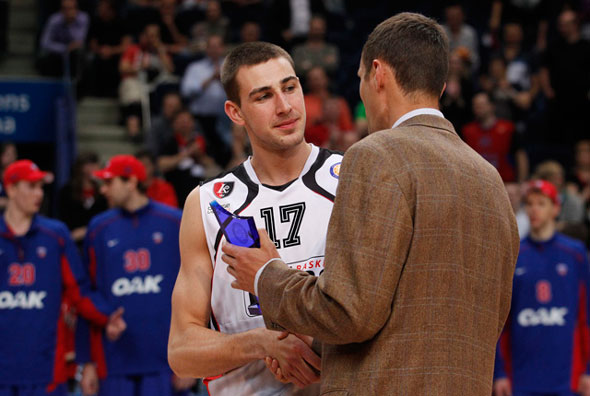
Spartak guard Patrick Beverley was another player who would move on to the NBA thanks to his brilliant play in the VTB United League. The club from St. Petersburg enjoyed a wonderful regular season, led by Beverley who finished among the league leaders in assists (4.4 per game) and efficiency rating (16.1 per game).
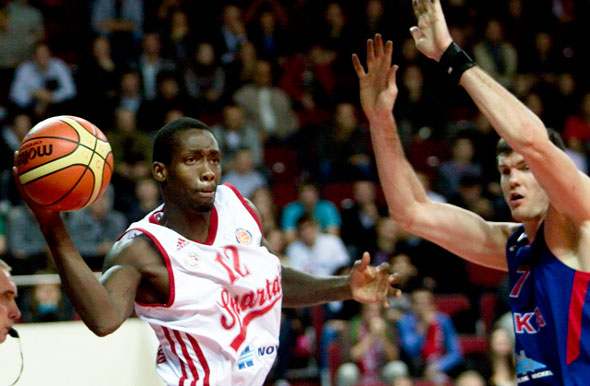
Nymburk was one of the biggest surprises of the regular season and Chester Simmons was the team’s unquestioned leader. Among his most impressive accomplishments were the season-best 35 points he dropped against Minsk-2006 and a cumulative 50 points scored against CSKA in two meetings.
Founded in 2011, Astana made a favorable impression in its debut season. The team was led by Rawle Marshall, who won the league’s scoring title, averaging 16.8 points per game.
Finally, Andrei Kirilenko. The greatest player in modern Russian basketball history, Kirilenko was terrific from start to finish. He led CSKA to the championship and earned two MVP’s (regular season and Final Four).
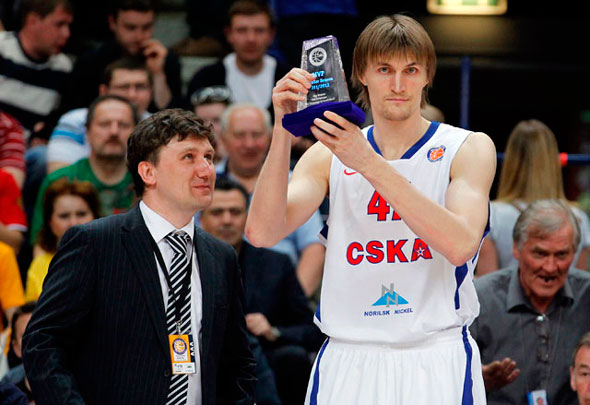
Pipeline
Several players from the VTB United League moved to the NBA during or following the conclusion of the season. In addition to Mozgov, Beverley and Valanciunas, Alexey Shved, DeJuan Blair, Donatas Matiejunas, Sonny Weems, Chris Quinn and Mickael Gelabale ended up in North America. Andrei Kirilenko also made his return to the NBA in 2012 following his golden season at CSKA.
Several attendance records were set during the 2011-12 season, with three of the league’s four-best attended games being played at Zalgiris Arena. The game between Zalgiris and Astana drew 13, 105 fans (second-most in league history behind the 15,812 fans that showed up in October 2012 for a game between CSKA and Zalgiris). Zalgiris and Krasnye Krylia drew 12,500, while Zalgiris – Khimki brought in 12,200.

38. Lietuvos Rytas crushed Minsk-2006 by a score of 112-86 in March. Vilnius scored 38 points in the final period, still a league record which has only been matched since (once by VEF and twice by Avtodor).
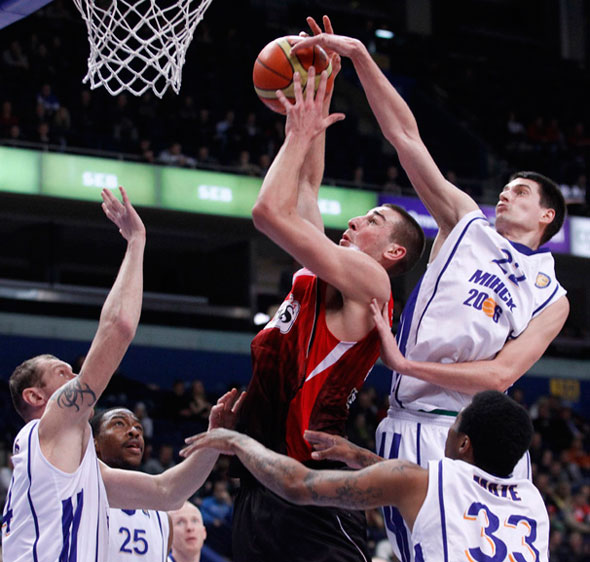
7. Aliaksei Trastsinetski of Minsk-2006 secured seven steals in a January game vs. CSKA, tying for the league record with Aaron Miles and Frederick House.
Final Results
